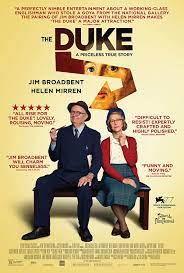
THE DUKE
UK, 2020, 96 minutes, Colour.
Jim Broadbent, Helen Mirren, Anna Maxwell Martin, Fionn Whitehead, Matthew Goode, James Wilby, Richard McCabe.
Directed by Roger Michell.
There was a joke at the time, 1962, which is reprised in this drama, Kempton Bunton and his wife in the cinema watching James Bond in Dr No. Bond admires Goya’s portrait of the Duke of Wellington, stolen by Dr No. In fact, the public knew that it had been stolen from the National Gallery. The Duke tells the story of what happened behind the scene as well as the media response.
The film opens with Kempton Bunton in court, charged with the theft of the portrait. Bunton is a cheerful man, pleading not guilty, starting to make his case. And then the screenplay goes back six months, offering a portrait of Bunton, defying the police concerning everyone paying the television licence, eliminating BBC reception so that he was within the law of not paying. Bunton is a working class man, committed to the cause of humanity, standing on street corners seeking petitions, to claiming his stances in public. His played marvellously by Jim Broadbent. Meanwhile, at home, there is his long-suffering wife, reminding us that Helen Mirren can play cleaning ladies as Well Is Queen Elizabeth convincingly, and a young son, Jackie (Fionn Whitehead). And there is grief for and daughter, long dead in a bicycle accident, reticence at home, but Kempton writing plays (never produced) about his daughter.
Then the theft of the painting and its finishing up in Kempton’s cupboard, a forced cupboard back supplied by his son.
Headlines, police intervention, Home Secretary concerned, speculation about gangs of professional art thieves… The media taking up the case.
Meanwhile, at home, Kempton getting jobs, losing them, standing up against worksite bullying, sending his plays to theatres… And the big plan that giving back the painting would mean a reward of £140,000 to be devoted to charities (and just think how many television alliances licenses that would cover).
Kempton returns the painting, arrested, and his trial, his defence lawyer played by Matthew Goode. Kempton, of course, can be quite the orator, which means that the Gallery, the jury, and some of the lawyers are entertained. While being acquitted generally of the crimes, he does receive a three month sentence because the frame had disappeared, meaning that he was guilty of this theft.
There is quite an unexpected twist towards the end which makes Kempton an even better man. It can be said that his family collaborated in giving information for the making of The Duke.
In a way, the film is slight, perhaps parochial in its portrait of Britain in the early 1960s, the heritage of the Duke of Wellington and Waterloo, the British spirit – manifested after the jury’s decisions with the Gallery and everyone bursting into national spirit singing Jerusalem. But, with Jim Broadbent and Helen Mirren, this is a reminder that even with slight stories, we can be impressed as well as entertained by expert performances.
- The title? The Duke of Wellington, Goya’s portrait, National Gallery, stolen, in ransom, restored?
- The story based on actual events, characters, family reminiscences of Bunton?
- Northern England, the cities, homes, streets, shops, squalid areas, taxis, bakers, atmosphere in 1961? The contrast with the wealthy house?
- The courts, the hearings, the Gallery? Prison sequences? The musical score?
- The story of Kempton Bunton, Jim Broadbent’s presence and performance? Age, marriage, long-suffering wife, their son, at home? Kempton’s political beliefs, the issue of the BBC license, the officials arriving, his answers, cutting off the BBC and therefore not required to pay? The taking of the painting, the ransom – and how many BBC licenses it would pay? His standing on street corners, with his son, in the rain? Philosophy of life? Politics?
- The film opening in the courts, the accusations, the response of the Gallery, the judge? The context of the flashbacks?
- Kempton’s wife, a cleaner, Helen Mirren’s presence? Exasperated with her husband, his appeal to humankind, her wanting a focus on the family? Seeing him on the street corner? Her work with the lady of the house, friendship, yet servant?
- The story of the painting, Kempton going to London, the visuals of the taking of the painting, getting inside the Gallery, taking the painting, Edvard Munch’s behind it? Taking it home? Hiding it in the cupboard, the son building the false wall? The couple staying in the room, the discovery of the partition, of the painting, the girl and her money ideas? Kempton’s wife, the discovery, dismay? His not having talked with her?
- The son, his friends, criminal activity, the welcome into the Bunton house? Behaviour, the sexual episode? Going out to the restaurant?
- Writing to papers, offering the ransom for charity, the reaction of the lawyers, of the police, suspecting a professional gang and Kempton laughing? The Home Secretary and his reaction?
- Kempton restoring the painting, the arrest, the trial, his earnest representation of himself, the discussions with his lawyer, the shrewdness of the lawyer, explanations of the situation? The judge, interventions? The other members of the bar? The Gallery, mistaking the statement of not guilty for the verdict? Does present in the Gallery, his son, the vigorous response of the owner of the house, her interventions? The arguments, the not guilty verdicts, the three-month verdict, the whole group singing Jerusalem?
- Kempton, in prison, three months, his wife’s visit?
- The revelation of the truth, the son having stolen the painting, the hiding of it, Kempton taking the blame?
- A very British story, almost parochial in its spirit, details – and the Jerusalem patriotism?